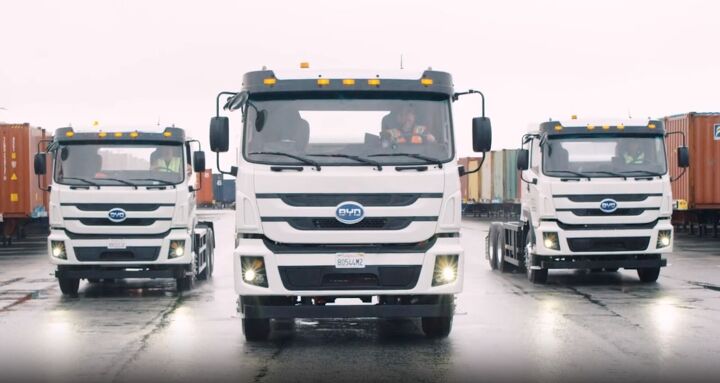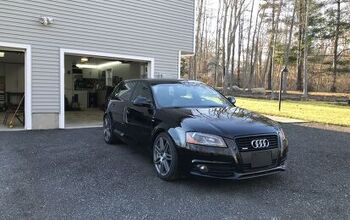China’s BYD Says Prospective Mexican Plant Won’t Export to U.S.

Chinese automaker BYD has been seeking to build an automotive plant in Mexico, with the company’s regional chief executive confirming the plan on Wednesday. CEO Stella Li has stated that BYD has yet to decide upon a final location. But that plan is for the site to boast a production capacity of 150,000 vehicles annually, with none being slated for export to the United States.
Despite focusing its quest for real estate in a country neighboring the United States, Reuters quoted Li as saying that the facility will exclusively serve the Mexican market. However, the decision may be out of her hands considering the way American legislators have spent the last several months mobilizing to try and prevent the importation of Chinese goods in the automotive and energy sectors.
From Reuters:
BYD outpaced former market leader Tesla in EV sales globally in the fourth quarter of 2023, and auto industry officials say its push into Mexico foreshadows a competitive threat the Shenzhen-based automaker and others from China may pose to companies already operating in the U.S. market.
A U.S. manufacturing advocacy group, the Alliance for American Manufacturing, this month warned low-cost Chinese cars and parts could threaten the viability of auto companies in the U.S. The group called on Washington to block the import of low-cost Chinese autos and parts from Mexico to prevent an "extinction-level event" for the U.S. auto sector.
Li said BYD's Mexico ambitions are solely geared at local sales, adding the company is scouting for factory sites in central and southern areas rather than northern Mexico near the U.S. border, where she said transportation costs to reach consumers would be expensive.
It would be reasonable to assume BYD is just trying to downplay things while tensions are high. But it’s also difficult to assume the vehicle it’s leading with would have been a sales success in the United States. This week, the company announced plans to sell its Dolphin Mini EV for roughly $21,000 in Mexico.
The Dolphin Mini is an incredibly small EV intended to be an urban runabout. It boasts roughly the same shape as a Honda Fit (Jazz if you’re European) with a maximum range of about 170 miles. But it’s a tad smaller than the Honda in just about every single dimension, takes nearly 15 seconds to reach 62 mph, and yields a top speed of just 80 mph.
While BYD does sell a larger version of the Dolphin that’s a tad bigger than the Honda Fit, and might appeal to American drivers, there have been no plans announced to manufacture the model in Mexico. Meanwhile, corporate leadership has continued to signal that it’s not interested in selling to the United States — even though previous statements have indicated the opposite.
BYD has been making investments in the State of California for several years and even purchased a shuttered RV manufacturing plant so it could assemble electric buses and other commercial vehicles under government contracts. At the time, it focused on promoting the fact that its vehicles were incorporating nearly 75 percent U.S. content. But it has been more reserved in making promises about its commitment to the United States since the government has started to introduce new provisions to exclude Chinese companies on national security grounds.
"Our plan is to build the facility for the Mexican market, not for the export market," stated Li.
While the statement has been framed as disingenuous, Li told Yahoo Finance the same thing — adding a little more context.
"We're not planning to come to the U.S.," the CEO explained. "It's an interesting market, but it is very complicated."
Those statements came after a bill was introduced in the Senate to increase the tariffs on Chinese imports by 100 percent and right before news broke that the White House planned on examining the national security risks associated with Chinese connected vehicle technologies that would presumably be inside all modern products. However, the Chinese government has placed U.S. brands selling in China (most notably Tesla) under similar scrutiny in the past and rarely allowed U.S. businesses to operate in its borders without creating a joint venture with domestic firms. All sides are presumably aware of the regulatory games being played and how it might influence foreign access to the two markets.
"I think they are [overreacting] a little bit," Li said. "A little bit too scared about Chinese competition. I never believe that trade protection will help any company."
"The Chinese market is the most competitive market. If you are the winner in the most competitive market why [can't you win] in other [countries]?"
Expect American manufacturers and legislators to continue focusing on what’s to be done about Chinese imports for the foreseeable future. This issue was already a maze of regulatory action and looks poised to become even more complicated.
[Images: BYD]
Become a TTAC insider. Get the latest news, features, TTAC takes, and everything else that gets to the truth about cars first by subscribing to our newsletter.

A staunch consumer advocate tracking industry trends and regulation. Before joining TTAC, Matt spent a decade working for marketing and research firms based in NYC. Clients included several of the world’s largest automakers, global tire brands, and aftermarket part suppliers. Dissatisfied with the corporate world and resentful of having to wear suits everyday, he pivoted to writing about cars. Since then, that man has become an ardent supporter of the right-to-repair movement, been interviewed on the auto industry by national radio broadcasts, driven more rental cars than anyone ever should, participated in amateur rallying events, and received the requisite minimum training as sanctioned by the SCCA. Handy with a wrench, Matt grew up surrounded by Detroit auto workers and managed to get a pizza delivery job before he was legally eligible. He later found himself driving box trucks through Manhattan, guaranteeing future sympathy for actual truckers. He continues to conduct research pertaining to the automotive sector as an independent contractor and has since moved back to his native Michigan, closer to where the cars are born. A contrarian, Matt claims to prefer understeer — stating that front and all-wheel drive vehicles cater best to his driving style.
More by Matt Posky
Latest Car Reviews
Read moreLatest Product Reviews
Read moreRecent Comments
- Tassos Under incompetent, affirmative action hire Mary Barra, GM has been shooting itself in the foot on a daily basis.Whether the Malibu cancellation has been one of these shootings is NOT obvious at all.GM should be run as a PROFITABLE BUSINESS and NOT as an outfit that satisfies everybody and his mother in law's pet preferences.IF the Malibu was UNPROFITABLE, it SHOULD be canceled.More generally, if its SEGMENT is Unprofitable, and HALF the makers cancel their midsize sedans, not only will it lead to the SURVIVAL OF THE FITTEST ones, but the survivors will obviously be more profitable if the LOSERS were kept being produced and the SMALL PIE of midsize sedans would yield slim pickings for every participant.SO NO, I APPROVE of the demise of the unprofitable Malibu, and hope Nissan does the same to the Altima, Hyundai with the SOnata, Mazda with the Mazda 6, and as many others as it takes to make the REMAINING players, like the Excellent, sporty Accord and the Bulletproof Reliable, cheap to maintain CAMRY, more profitable and affordable.
- GregLocock Car companies can only really sell cars that people who are new car buyers will pay a profitable price for. As it turns out fewer and fewer new car buyers want sedans. Large sedans can be nice to drive, certainly, but the number of new car buyers (the only ones that matter in this discussion) are prepared to sacrifice steering and handling for more obvious things like passenger and cargo space, or even some attempt at off roading. We know US new car buyers don't really care about handling because they fell for FWD in large cars.
- Slavuta Why is everybody sweating? Like sedans? - go buy one. Better - 2. Let CRV/RAV rust on the dealer lot. I have 3 sedans on the driveway. My neighbor - 2. Neighbors on each of our other side - 8 SUVs.
- Theflyersfan With sedans, especially, I wonder how many of those sales are to rental fleets. With the exception of the Civic and Accord, there are still rows of sedans mixed in with the RAV4s at every airport rental lot. I doubt the breakdown in sales is publicly published, so who knows... GM isn't out of the sedan business - Cadillac exists and I can't believe I'm typing this but they are actually decent - and I think they are making a huge mistake, especially if there's an extended oil price hike (cough...Iran...cough) and people want smaller and hybrids. But if one is only tied to the quarterly shareholder reports and not trends and the big picture, bad decisions like this get made.
- Wjtinfwb Not proud of what Stellantis is rolling out?




































Comments
Join the conversation
There is a huge untapped market in Central and South America. BYD has the right mix of products to fit this market. I also think they have brand recognition because investment in electric public transportation, has probably put the BYD logo in front of a lot of peoples' eyes.
So Americans are stuck paying higher prices then???